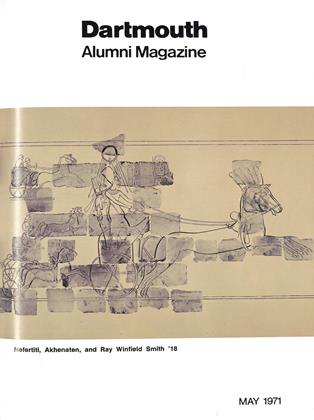In an interclass track meet from which varsity members were not excluded, on the site of the present Memorial Field, a great array of freshman athletes gathered in the fall of 1916 which must have gladdened the heart of Coach Harry Hillman. lack Gorton, Charlie Carter, Laddie Myers, Jack Jordan, Chick Hopkins, Charlie McGoughran, lohn Prentiss, Charlie Crathern, Charlie Goodnow, and Earl J. "Tommy"Thomson, to name the cream of the crop, won the interclass meet by a substantial margin. The outstanding performer was "Tommy" Thomson whose speed and form over the high hurdles were incomparable. After winning this event "Tommy," without breaking his stride took his turn in the high jump and cleared the bar at slightly over six feet with ease—and a six foot jump in those days was a stellar performance. An Olympic star was rising under the watchful eye of Harry Hillman, himself an Olympic Champion of an older generation.
Tommy was born in 1895 on a farm near Prince Albert, Canada, but he moved to southern California at the age of eight where he became a youthful track star in high school, at one time winning the interscholastic high hurdles, the discus throw, and tying for first place in the high jump. He entered Dartmouth in 1916 where he continued his winning ways until his collegiate career was interrupted by service in the Royal Canadian Air Force as a Canadian volunteer.
In the Olympic Games at Antwerp in 1920, representing Canada, Tommy won a gold medal and set a new 120 high hurdle record which stood for eleven years before it was bettered.
In 1922 he married Anne Brunner Cookman, a California debutante. From this union three daughters and a son were born. Two of the daughters were twins and thereby hangs a tale. One of the daughter twins gave Tommy and Anne a second set of twins, and one of these twins blessed the great grandparents recently with another set, so the Thomsons now lay claim to a set of twins in each of three successive generations. This perhaps can be a unique record and may even be classified as an Olympic performance!
Earl became a successful head coach of track at West Virginia University in 1923, shortly after getting his Dartmouth degree. Later Yale called on him to take over a similar position at New Haven. His success there earned him a call to the U. S. Naval Academy at Annapolis where he continued to coach until 1963. While at Navy he compiled an excellent record. His teams won 150 victories against 67 defeats. Arch rival Army was defeated frequently in dual meet competition.
Probably the high point in Tommy's career was the period 1943-1946. The Navy was loaded with talent and Coach Thomson made the best of his opportunity. Three times his team captured the IC4-A championships, led all opposition in the Heptagonals, and in 1945 won the NCAA championships. He was selected for the Helms Foundation Hall of Fame and to the Canadian AAU Hall of Fame.
In 1952 he coached track men for the Olympics and three of his proteges who qualified to represent the United States did well in the Olympic competition. One won a silver medal in the high jump and a second won a bronze medal in the high hurdles.
After retirement from Annapolis in 1963 the Thomsons moved to Oceanside, Calif., where Tommy coached the Camp Pendleton Marine track team. Once again he was eminently successful. Several of his men qualified for the 1964 Olympics. One of them, Billy Mills, brought to the United States a gold medal in the 10,000-meter run, a feat heretofore accomplished by no other American track star.
Honors have continued to be awarded Earl Thomson. In 1964 the New York Academy Association selected him for its annual award "for outstanding service, loyalty, and devotion to the United States Naval Academy." And the DAR presented him with its highest medal award as an adult naturalized citizen displaying the requisite qualifications as an American.
To his wife, Anne, the choicest possession among Tommy's many trophies, medals, and citations is a grade school text book which deals with his health program and is dedicated to him for the great athlete and sportsman he has always been. What a wonderful tribute to an Olympian.
To know Tommy Thomson is to know greatness, to recognize stamina, to feel the great competitive spirit of a leader among men, to have associated with one of Dartmouth's finest.
Earl J. Thomson '20
 View Full Issue
View Full Issue
More From This Issue
-
 Feature
FeatureNefertiti, Akhenaten, and Ray Winfield Smith '18
May 1971 By John R. Scotford Jr. '38 -
 Feature
FeatureThe Dartmouth Institute
May 1971 -
 Feature
FeatureTrustees Vote to Consider Associated School for Women
May 1971 -
 Article
ArticleThe Undergraduate Chair
May 1971 By JOEL ZYLBERBERG '72 -
 Article
ArticleFaculty
May 1971 By WILLIAM R. MEYER -
 Article
ArticleHanover's Famous May "Murder"
May 1971







